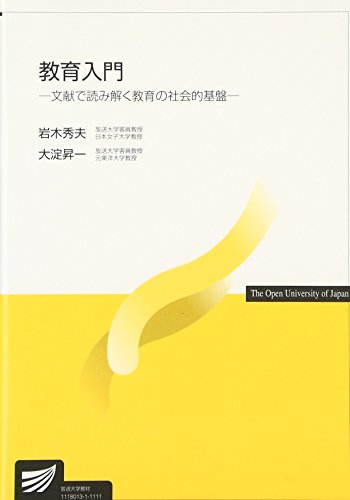- 著者
- 岩木 秀夫
- 出版者
- 日本女子大学
- 雑誌
- 現代女性とキャリア : 日本女子大学現代女性キャリア研究所紀要 : ri-wac journal (ISSN:18843085)
- 巻号頁・発行日
- vol.1, pp.47-91, 2009-09-30
1 0 0 0 教育入門 : 文献で読み解く教育の社会的基盤
- 著者
- 岩木秀夫 大淀昇一著
- 出版者
- 放送大学教育振興会
- 巻号頁・発行日
- 2011
1 0 0 0 OA 総合選抜制度の教育効果 学力水準との関連で
- 著者
- 岩木 秀夫
- 出版者
- 日本教育社会学会
- 雑誌
- 教育社会学研究 (ISSN:03873145)
- 巻号頁・発行日
- vol.32, pp.80-92,en198, 1977-09-30 (Released:2011-03-18)
Joint selection or “sogosenbatsu” has now become one of the most important issues about senior high school education. The most controversial point about it is whether it degenerates academic standard of senior high school education or not. This paper deals with this problem.The hypothesis has been held by advocates of joint selection system that equal distribution of high school entrants' academic ability (which ought to resolve school differential) among several schools (which constitute one school set) through joint selection would, far from lowering academic standards of high school education, raise it on the contrary. In the context of “school production function” study in America, the opinion that asserts the existence of peer cultural influence on cognitive output was exposed to severe criticism, but in Japan it might have every reason to be believed in, in view of her different racial and social class situation. According to this opinion, dissemination of “academic culture”, in stead of confining it into limited elitist schools, would elevate the level of academic output from school system as a whole. Hence the hypothesis cited above.Comparison before and after implementation of joint selection system of academic output, which is measured by a percentage of applicants who were admitted, from fourteen school sets in five prefectures shows maintenance or upgrading of its standards in all cases. In some cases, considerable uprising which suggests the effect of joint selection was observed. Cross-sectional analysis of nation-wide data in 1975, however, made it clear that the standard of academic output correlated with university entrance ratio (r=.76), but not with school differential (r=.01). Correlation between upgrading of academic standards and resolution of school differential found out by trend analysis of fourteen cases, therefore, came out to be false correlation. Thus, initial hypothesis was not supported. The effect of hitherto overlooked factor, i. e. university entrance ratio, was brought to light by this study.
- 著者
- 岩木 秀夫
- 出版者
- 不明
- 雑誌
- 日本教育社会学会大会発表要旨集録
- 巻号頁・発行日
- no.29, pp.127-128, 1977
1 0 0 0 OA 高校生文化と進路形成の変容(第3次調査)単線型教育体系における多様化政策の課題
実証研究の結果、日本の高校では確かにゆとりから学力回帰の流れが起きており、学力向上のためには、かつてのメリトクラシーとトラッキングの組み合わせによる構造に起因する動機付けでは無く、また内発的動機付けに期待する多様化の制度改革も一段落して、今日では学校生活の楽しさと個別的面倒見主義による動機付けが強調され、あるいはそれを支える新自由主義的競争原理の導入などが進行していた。しかし、そうした動向は主体性や創造性などの従来からの教育的価値を損なう危険を秘めていた。研究グループは、シンガポールとの国際比較研究から、代案として複線型教育体系もしくはその要素の一部を日本に導入することを検討した。
われわれが1979年以来行ってきたデータの再分析、および日本、シンガポールの再調査を行っている。シンガポールは、非常に学歴が重視される国であり、研究者の間ではメリトクラシー(能力と努力の結果が支配する)の国であると考えられている。こうした背景には、シンガポールの国際社会やアジアにおける軍事的、経済的位置づけやさらには多民族の融合というこの国独自の事情がある。しかし、それだけでなく、人々を学習に駆り立て、学習の結果を人材の社会的配分の基準にすることを正当化するような考え方や仕組みが存在する。一昨年度以来のわれわれの調査では、シンガポールは、教育政策においてアファーマティブ・アクション(マイノリティへの優遇:大学入学枠の確保、点数の加算など)や救済重視的な社会的敗者対策はとらずに、競争参加への機会均等をすべての国民に対して保証する/競争の結果に基づいて地位配分を行う/競争の結果に基づいて地位配分が行われるプロセスと基準を明確化し納得させる/競争の内容(学習の内容と方法)を明示化し納得させる/競争の内容(学習の内容と方法)を「学問中心」ではなく、生徒の興味、企業からの要請や国際社会からの要請に応じたものにしている/競争の内容(学習の内容と方法)が卒業後の生活と結びついていることを生徒に認知させ、納得させる/競争の結果に基づいて手厚いエリート教育と手厚い大衆教育を行う/敗者復活の機会を用意する、などの教育政策を採っている。しかし、こうしたシステムのあり方に加えて、授業面で、私たちの知見では、シンガポールは、授業内容が卒業後の進路とレリバンスが高く、それを可能にするために、コース設置、教員採用、カリキュラム、教科書などが、現場裁量に任せられる部分が大きく、ガンバが進路先とコミニュケーションを親密にとっている。
